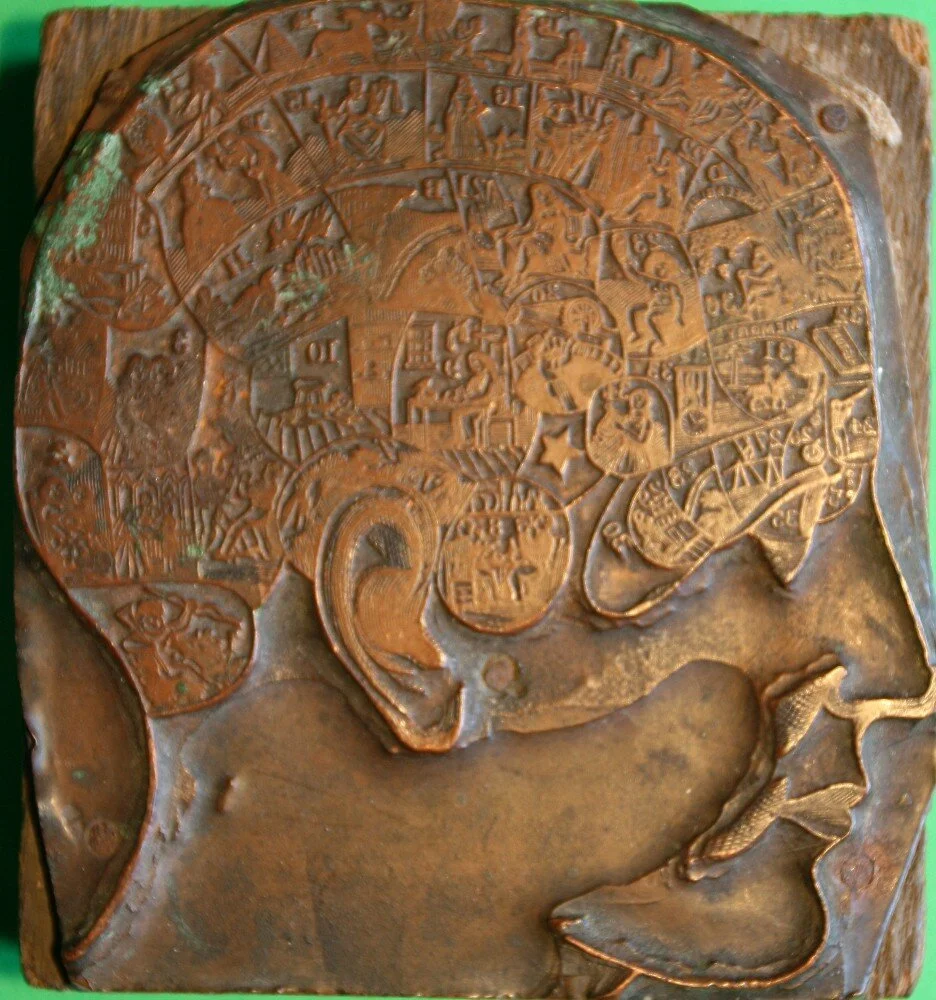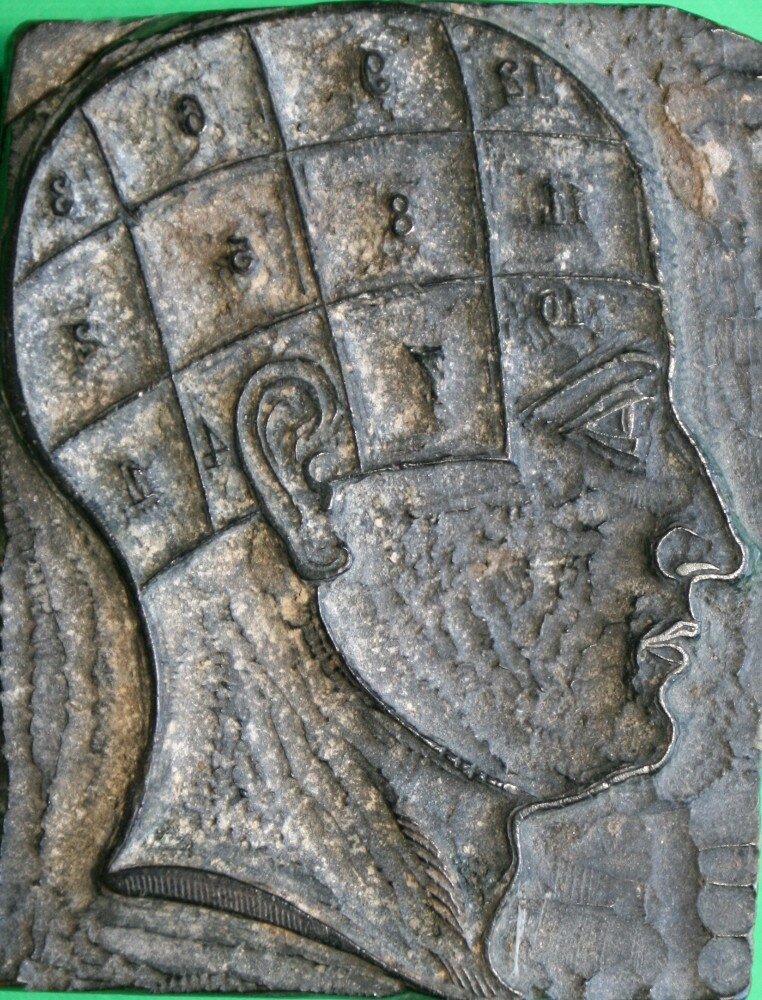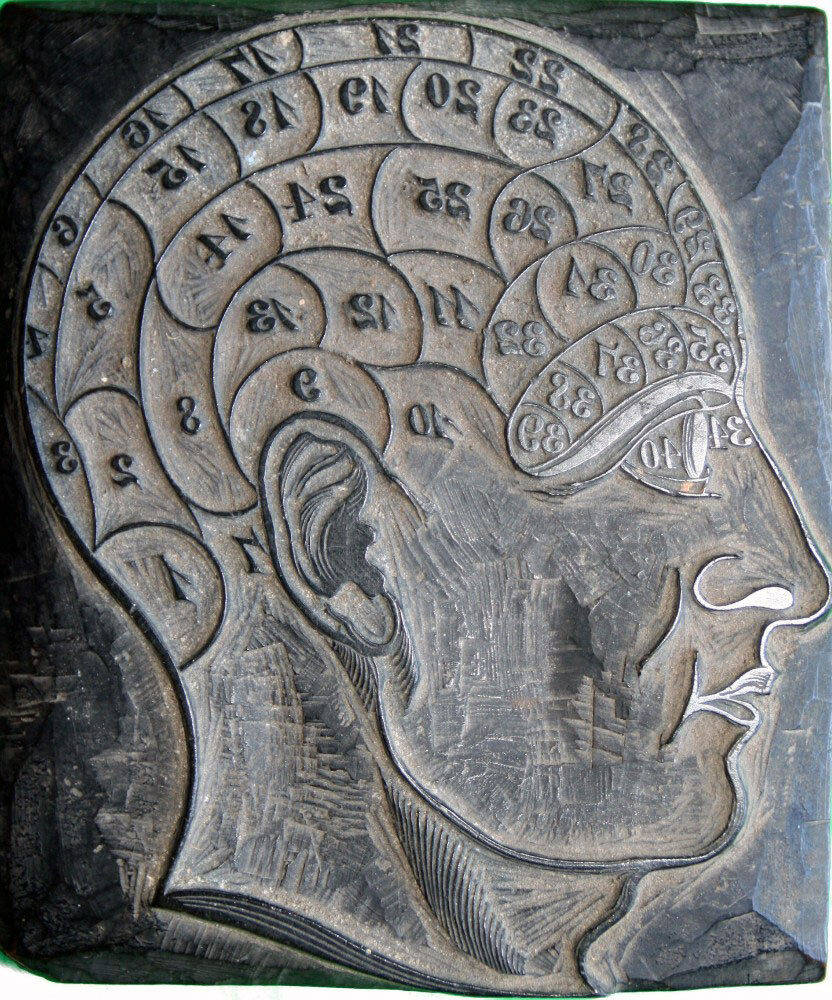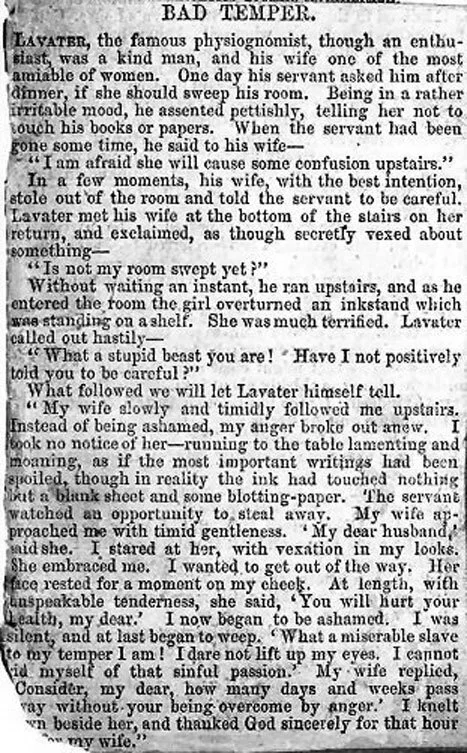Introduction to Phrenology by George Burgess & Professor G Rudd
George Burgess (1829 -1905) practiced Phrenology in the Shopping Arcades, Bristol from 1861 to 1901.
Two books he published about or after 1871, and most likely published in the Bristol area, can be viewed from this site.
The first book is a general guide to Phrenology. The Scriptural passages in it were searched out by George Burgess in 1868.
The second book was used by George Burgess until his retirement in 1901, the readings being entered into this book by George Burgess for his customers to keep.
During the early part of the 20th Century Professor G Rudd did phrenology readings of George Burgess's son-in-law William Edward Baglin (1839-1908) and his grandson Edward William Burgess Baglin (1906-1969). Both these readings are also published here.
Useful Links on Phrenology
The History of Phrenology: A Chronology - The Victorian Web
Life History of George Burgess - And his family on FamilyPedia
Below: Phrenology Ink Head Stamps Used by George Burgess in his Profession
Brass ink stamp used by George Burgess in his phrenology profession
Small wooden ink stamp used by George Burgess in his phrenology profession
Large wooden ink stamp used by George Burgess in his phrenology profession
Phrenology in Victorian Scrapbook of Newspaper Articles by George Burgess
During his lifetime George Burgess cut out and stuck over 500 articles from Victorian era newspapers, most of which are copied and transcribed on this side. Two of those articles, entitled `Phrenologist' and one on 'LAVATER (the famous physiognomist') are copied below:
Phrenologist
LAVATER (the famous physiognomist')
For Reference: Below - Contents and Page Numbers for Both Phrenology Books by George Burgess
Phrenology Book 1: Contents
Page 1
The science of human nature
Health (Stomach, Heart, Lungs, Skin, Brain, Health)
Page 2
Texture (Fitness, Coarseness)
General Form (Measurements, Stature, Size, Bone, Muscle, Flesh, Shape, Perfect)
Page 3
Feet (Large, Small, Arched, Flat, Ugly, Beautiful, Walk, Corns)
Page 4
Hands (Long, Short, Square, Rough, Smooth, Beautiful, Shaking Hands)
Neck (Long, Short, Perfect)
Page 5
Ears (Rough, Fine, Projecting)
Jaws (Heavy, Light, Round)
Chin (Large, Small, Hard, Dimpled, Beautiful)
Mouth (Small, Large, Closed, Open, Down, Up, Perfect)
Page 6
Voice (Light, Heavy, Plaintive, Rough, Smooth, Winning, Noble)
Talk (Rapid, Slow, Regular, Irregular, Plain, Ornamental, Perfect)
Lips (Thick, Thin, Calm, Restless, Beautiful)
Page 7
Nose (Breadth, Sharpness, Length, Snub, Hollow, Arched, Perfect)
Eyes (Large, Small, Bright, Dull, Black, Brown, Hazel, Blue, Beautiful)
Page 8
Face (Short, Long, Flat, Keen, Round, Square, Oval)
Expression (Permanent, Variable)
Page 9
Complexion (Dark, Sallow, Red, Light, Fair, Beautiful)
Hair (Dark, Brown, Auburn, Sandy, Light, Straight, Curly, Course, Fine, Flat, Upright, Beautiful)
Beauty (Personal beauty, Perfect, Personal Beauty)
Page 10
Head (Size, Skulls, Small, Large, Long, Short, Broad, Narrow, Low, High, Round, Square)
Page 11
Forehead (Small, Large, High, Low, Reason, Observation, Memory, Brow, Square, Sharp, Perfect)
Page 12
Signs of Character in the Head
Page 14
General Health
Bodily Strength
Health of Digestion
Health of Blood
Health of Lungs
Health of Liver
Page 15
Health of Nerves
Marriage Love
Love of Children
Friendship
Love of Home
Continuity
Page 16
Courage
Destructiveness
Temper
Sensitiveness
Acquisitiveness
Secrecy
Page 17
Caution
Love of Praise
Self Esteem
Firmness
Self-Confidence
Conscience
Page 18
Hope and Faith
Spirituality – Belief
Veneration
Benevolence – Kindness
Constructive Ability
Sense of the Beautiful
Page 19
Imitative Ability
Mirth – Wit - Humor
Individuality
Perception of Form
Perception of Size
Perception of Weight
Page 20
Perception of Color
Order and Method
Talent for Numbers
Memory of Localities
Memory of Events
Sense of Time
Page 21
Love for Music
Flow of Language
Reasoning Ability – Causality
Comparing Ability – Criticism
Human Nature
Agreeableness – Courtesy
Phrenology Book 2: Contents
Page 1
Signs of Character in the Head
Page 2
General Health
Page 3
Bodily Strength
Health of Digestion
Page 4
Health of Blood
Health of Lungs
Page 5
Health of Liver
Health of the Nerve System
Page 6
Mental Observation of Individuality
Perception of Forms
Page 7
Perception of Sizes
Perception of Weight
Page 8
Perception of Colors
Order and Method
Page 9
Talent for Numbers
Constructive Ability
Page 10
Sense of Time
Memory of Localities
Page 11
Memory of Events
Reasoning Ability
Page 12
Comparing Ability
Human Nature
Page 13
Imitative Ability
Mirth – Wit – Humor
Page 14
Language
Ability and Love for Music
Page 15
Sense of the Beautiful
Agreeableness
Page 16
Benevolence – Kindness
Hope and Faith
Page 17
Spirituality
Religious Feeling
Page 18
Conscience
Self-Esteem
Page 19
Love of Praise
Caution
Page 20
Secrecy – Reserve
Self-Love – Economy
Page 21
Application
Firmness
Page 22
Self-Confidence
Courage
Page 23
Destructiveness
Temper
Page 24
Sensitiveness
Friendship
Page 25
Love of Home
Love of Children or Pets
Page 26
Marriage Love
The Guide to Marriage Happiness
Page 28
The Guide to Health
Page 29
Occupations
Page 35
The Value of Phrenology
Page 36
Physiognomy The Art of Reading Character





